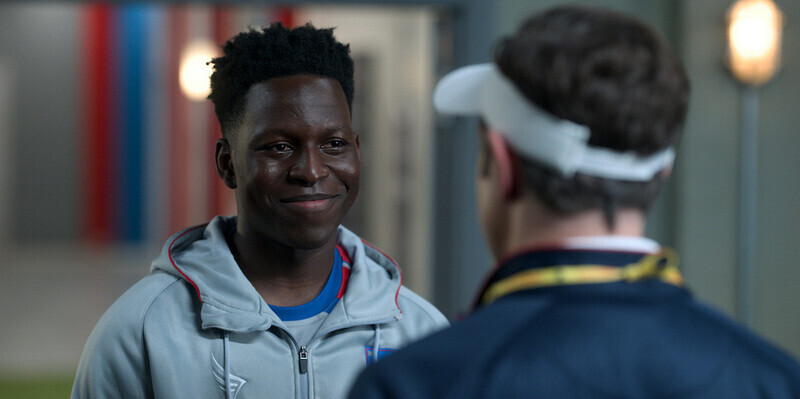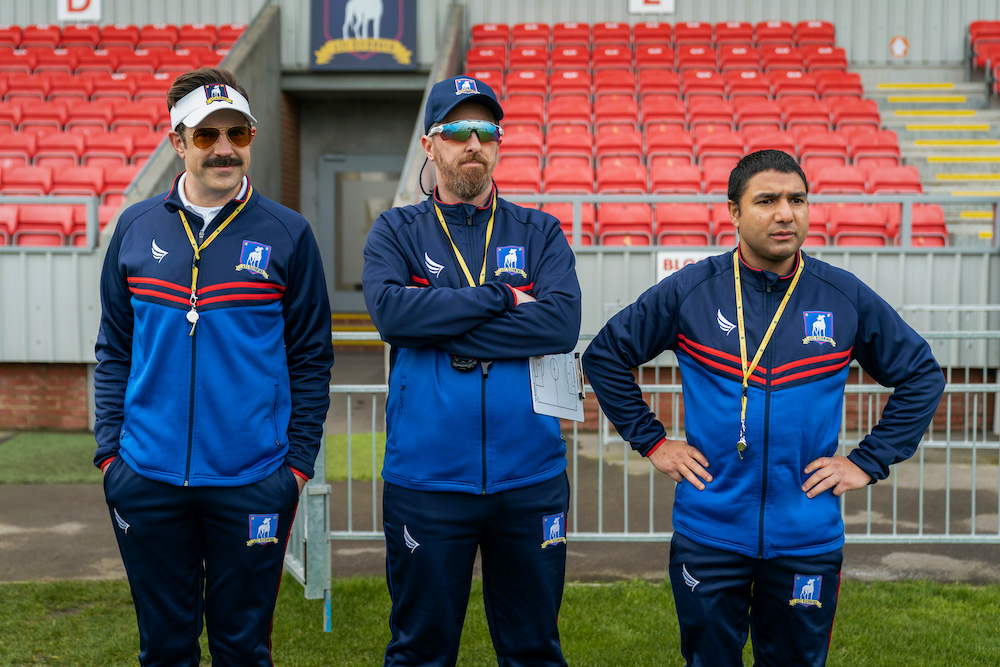One of the biggest surprises of 2020, aside from a global pandemic, was the success of AppleTV+’s “Ted Lasso.” Based on the NBC Sports skit character, the series starring Jason Sudeikis as an American coach in England went from a cutesy offering on the streaming service to a word-of-mouth hit, and then a 20-time Emmy nominee. I say surprised because I did not think that kindness, as necessary as it is in the world, would create such a large narrative hold in the incredibly busy TV landscape. The comedy wasn’t my cup of hot, brown water (that’s what Lasso calls “tea”), but season two is more charming by focusing more on the Lasso effect, instead of forcing you to like Ted.
Season two of Lasso’s show could be subtitled “The Book of Ted.” It’s no longer primarily about the American coach being like a flapjack out of the griddle, to quote Lasso*, but rather the effect his subversive sunniness had in the last season on the various hot heads and others who lead with their anger and ego. With many different plot lines gently pushed forward, the second season is more endearing as it hangs out with one easygoing story before moving to another, while keeping up the folksy plotting that fans so responded too. There’s even a Christmas episode mid-season, and it might be the best display of the show’s heart, and the sweetness it’s created with its ensemble of affable emotional underdogs.

Take superstar Roy Kent (Brett Goldstein), who hung up his jersey at the end of the season, and is now trying to find stability with Keeley (Juno Temple), who is a budding entrepreneur and model. Kent finds new purpose as a sports commentator, but stays true to his gruff, abrasive, cuss-heavy nature. There’s even hope for egomaniac Jamie Tart (Phil Dunster), who begins the season in a funny place after having previously left the AFC Richmond soccer team. His arc is unexpected, and it’s welcoming that the series has faith in him, as aggravating as Jamie’s showboating can be. Lasso empowers his players by stepping away from the machismo playbook, like Nick Mohammed’s Nathan, who has been promoted from “kitman” to coach. The series gets many jokes out of Nathan’s intensity, speaking like he didn’t get the memo about restraint before he goes back to his more reserved ways. And the series gives even more screen-time to Toheeb Jimoh’s player Sam Obisanya, especially when he leads a cause that hits close to home, bringing his team together.
Ted Lasso can be a lot for some people when they meet him, in part because being so kind can be, sadly, strange. But that’s also the effect of watching a character that is so transparently demanding to be liked for taking on kindness, from both the other people in his folksy world, and the audience. Humor is a big method, and his one-liners can be especially groan-worthy. Sudeikis barrels through them as if canned laughter is waiting on the other end: “Yikes! I ain’t seen someone this disappointed to see me since I wore a red cap to a Planned Parenthood fundraiser.” Lasso becomes a Golden Retriever for such cloyingly cute comedy like that, which at least feel more restrained this time because other characters have more space. But his character remains a chintzy mix of dialogue written for motivational posters and try-hard comedy that dares you to be a buzzkill. He is the worst part of his own show.
It’s funny then, that the series brings in a no-BS therapist named Sharon (Sarah Niles), especially after an incident in the first episode that has star player Dani Rojas (Cristo Fernández) no longer saying “football is life,” but rather, “football is death.” She sticks around to watch other players, and to dig at who Lasso really is. Lasso is uncomfortable with the prospect of true introspection, and she clocks his pleasantries and deflective nature, cutting at what is most interesting about Ted: that he’s good with others, but a bit less with himself. To see him squirm under the lone spotlight of therapy is interesting, and inspired. It makes him more of a human being, instead of such a hollow vessel to display unquestionable niceness on the small screen.
*Ted Lasso did not actually say this.
Five episodes of season two screened for review. Season two premieres on AppleTV+ today, July 23.












